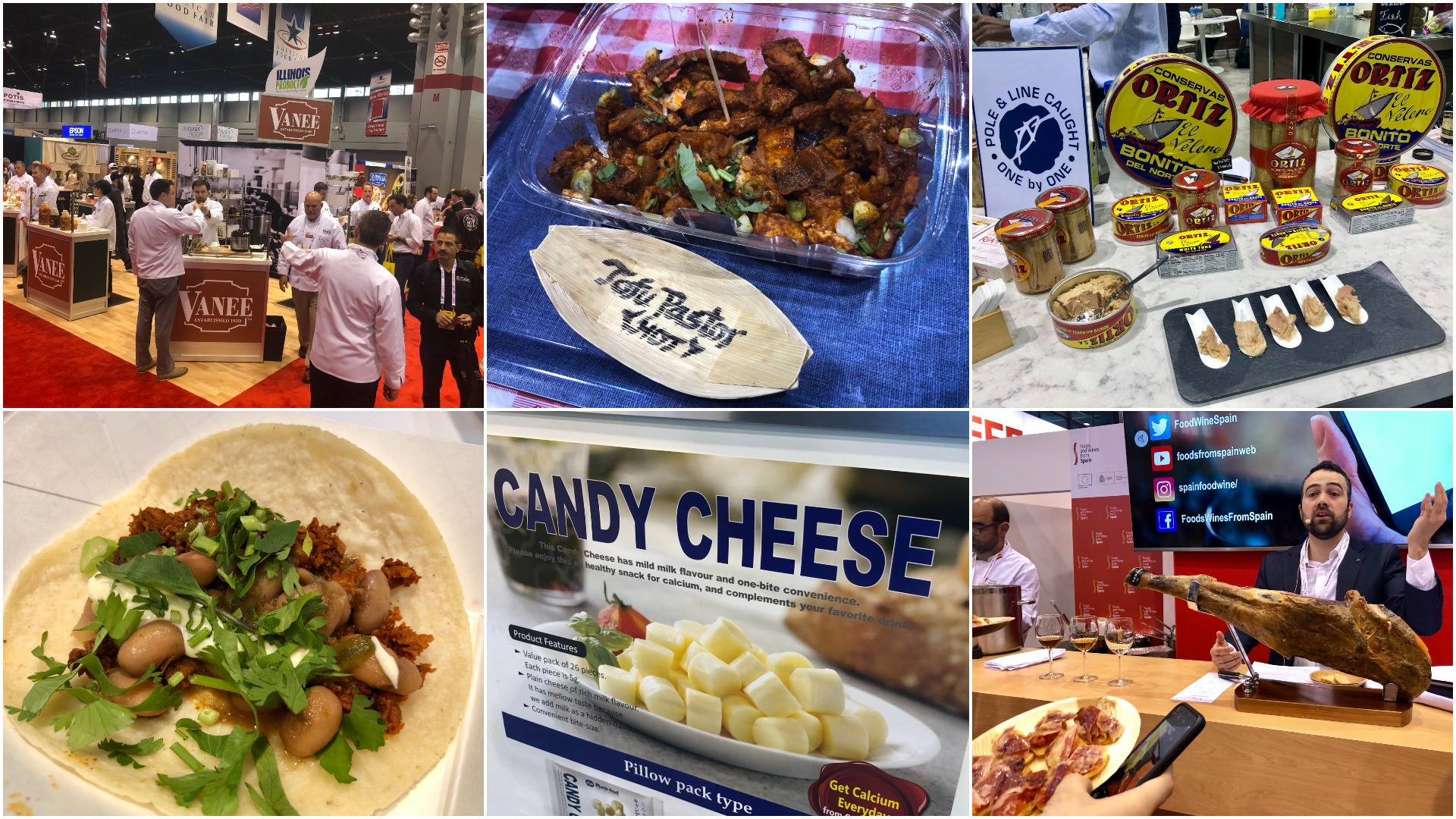The Delicious Meatless Future Is Now, And Other Finds From The 2019 National Restaurant Show
I was revisiting old bylines when I came to the realization: For more than one-third of my life—37% of every year I've been on this Earth, to be exact—I've been attending the National Restaurant Association's show in Chicago. Like Christmas and Fourth of Julys, I now mark the passage of time when The Show comes around every May.
The convention brings together some 43,000 attendees, and is, to state baldly, a sensory concussion—food samples, new cooking technology, the latest culinary trends, seemingly endless free pours, all spread out over an exhibition hall the size of 22 football fields.
As a journalistic exercise, it's nearly impossible to cover—there's just no way to visit every booth—but even a speedy walk through the convention hall gives you a sense of what you may encounter in restaurants and store shelves in the coming year. I remember at the show about 12 years ago, when this condiment heretofore-known-only-to-Asians called Sriracha was hailed as the next great hot sauce—and now, lo and behold.
I spent four hours this past Saturday roaming Chicago's McCormick Place, really no time at all. But I did taste some delicious food samples and formed some 30,000-feet impressions.
What was most apparent was the encroaching presence of plant-based foods in our lives—and I, for one, welcome it. In the last 15 years this has incrementally grown from niche to mainstream, and the idea that vegan facsimiles could never taste like the "real thing" is now an antiquated notion.
Speaking to the team at Impossible Foods (the $2 billion-valuation company supplying plant-based burgers to Burger King, White Castle, and many restaurants across the country), they told me Impossible had reconfigured their recipe in January in a major way. In short, they had switched from a wheat protein to a soy protein, while reducing coconut oil and increasing sunflower oil. When I tasted this new formulation, I was blown away—not by how it tasted, but how closely it mimicked beef. Whereas the old Impossible burger had a squeaky texture to the patty (a bit like Beyond Meat's), the new recipe tactilely felt almost indistinguishable from ground beef. I was served a teriyaki meatball at the Impossible booth and couldn't tell the difference—and I'm an avowed, proud, unrepentant beef eater.
We've come a long way from the veggie cardboard fritters of yesteryear. Still, until this weekend, eating Impossible and Beyond always felt like consuming an impression of a burger. The taste was satisfying, sure, but the differences were noticeable enough that psychologically it felt not all the way there. (Beyond Meat is available in grocery stores; Impossible will begin selling in retail later this year.) In the year 2019, I can say confidently I could eat one of these plant-based burgers—Impossible's, definitely—and experience no mental block that it wasn't the real thing.

Elsewhere in the meatless scrum, I found a dead ringer for chorizo at MorningStar Farm's booth—the plant-based crumbles will be on the menu at Big Star for the next month, arguably Chicago's most popular and beloved taqueria. It's really hard to tell it isn't pork sausage. Another great Chicago vendor, Phoenix Bean, was offering "tofu al pastor," a rather novel and delicious way of showing how tofu is a chameleon ingredient.

Of course, the plant-based now represents but a sliver of our meat-eating reality. Vendors everywhere were passing out nibbles of sausage, steak, gourmet jarred tunas, seared duck breast—it felt like Costco's Saturday free samples day shot up on HGH.
Jimmy Dean's was giving away samples of sausage and gravy-stuffed hash browns, a product that was awarded a 2019 Food and Beverage Award in innovation. When I posted this on Twitter the reaction was split between "this is genius!" and "this is horrifying!" Truthfully, it doesn't deserve such hyperbole. The only novelty is it takes two beloved foods and continued America's longstanding tradition of smashing shit together. It's a meat-and-cream filled toaster strudel made of crisp potatoes, and it's exactly what you think it tastes like.
I'm roaming the National Restaurant Show and the first thing I encounter is the Hot Pocket of our generation: Sausage and Gravy-stuffed Hash Brown from Jimmy Dean pic.twitter.com/CFXMZBSWg1
— Kevin Pang (@pang) May 18, 2019
One seismic shift in food service the last 12 months is the industry's about-face on plastic straws, a product that's become anathema in stunning time. Under the convention's exhibitor guide, I counted 33 companies in the "sipping straws" category at the show. Without stopping at all 33 I can't say they're all offering a compostable alternative, but many I visited were. One of the more intriguing offerings was from a San Francisco start-up called HAY! Straws, which proposes plastic straws are bad for the environment, paper straws get soggy, metal straws are expensive. Their solution is to create a straw made from straw, that is, from biodegradable wheat stems.

I've been sipping drinks all weekend from samples I received, and gotta say, they feel tactilely satisfying, with the jumbo straws (pictured above) sturdy as bamboo straws I've come across. That said, you can also subtly taste the wheat, even if the company says it soaks and triple-washes the straws in sterilized water. Nevertheless, this is the type of product that you'd expect to show up on Shark Tank.
